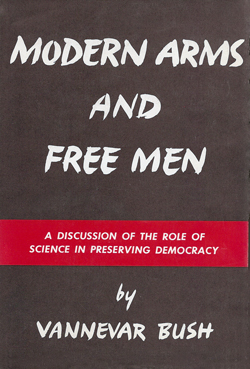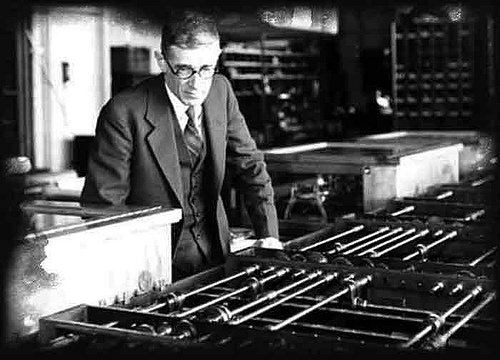This post is adapted from an assignment for an American intellectual history seminar.

The first half of Vannevar Bush’s Modern Arms and Free Men (1949) is a straightforward explanation of the progress made in military technology since 1918. This is the “Modern Arms” part of the book: Bush wants to be certain the reader understands recent developments before he tackles what they mean for “Free Men.” He is careful not to alienate readers without an existing grasp of the subject, and he also seems to step very carefully in establishing his authority: “For ten years,” he writes, “thanks to the accidents that direct men’s lives in a democracy, I was in a position to see as much as any single man could see… It is part of the obligation of any citizen who has been given such responsibility and opportunity as I have, no matter by what accident, to set down for the record what he has learned, and to share with others any light it may throw on the great question of war or peace that haunts us all.” In the second half of the book, he ruminates on democracy and the coming Cold War, as well as on the influence of modern military technology on both issues.
In general, Bush comes across as a technocrat who believes that scientifically trained experts can and must have a disproportionate influence on national policy, particularly as the United States continues to face off against totalitarian powers like the Soviet Union. But this technocracy and elitism is tempered by a democratic idealism that seems to rely on alchemy, a faith in a political process that works in eldritch ways to make everything turn out for the best. The modern world is morally and technically complex, and in a democracy the people at large are somehow responsible for their collective actions and choices. “Must every citizen, then, grasp the full nature of atomic energy, evaluate the modern submarine, predict the consequences of supersonic flight, or grasp the mentality of those who rave at us in councils?” No. But neither can they “take refuge in the assertion that these are matters for specialists,” precisely because of democracy. Bush waves his hands at the contradiction and takes comfort in victory. “Every citizen, in a strange subtle way, visualizes where we are and where he feels we are going, and from this is distilled, in a way we hardly understand, our national policy in every regard. It is not just through votes, or editorials, or commentators that this action occurs, but more indirectly and through a thousand channels.” Bush’s vox populi is a kind of invisible hand, or a silent voice.
This faith is rooted in experience, and little else. Bush offers no convincing explanation for why democracy works so well: it just does, perhaps because of fairness or the efficiency of market-shaped interactions. The U.S. effort to build an atomic weapon was democratic and to some extent egalitarian, as Bush knew: “If civilians and military disagreed, as they often did, there were tables about which they could gather and argue it out… the system worked and it produced results.” The Germans, on the other hand, “were also trying to make a bomb, and they failed miserably.” This was partly because of Hitler’s ineptness and insistence on the party line, but mostly because of the structural unfreedom of scientific effort under fascism.
Soviet communism, he argues, will have a similarly deadening impact on science. Although the Russians have men of vision, “science will eventually become a collection of superstitions and folklore… it will take time. The spirit of a great people that has produced sparkling figures in the past in music, in mathematics, in art and science, will not be broken in an instant…” But it will be broken. Freedom is a necessary precondition for scientific achievement, and democracy offers more of it than totalitarianism. As Arthur Schlesinger, Jr. wrote later in The Vital Center, the U.S. and USSR are both “children of the Industrial Revolution,” but the differences between them by the 1950s did reflect a clear divide between free society and totalitarianism—a distinction that was clear in and of itself even if its implications were debatable.
Bush hints elliptically at the questions of collective guilt and “war crimes” raised by many commentators on World War II, from Dwight Macdonald in “The Responsibility of Peoples” (1945) to Errol Morris in “The Fog of War” (2004). In discussing the impact of the atomic bomb on political life, he says, “The fire raids upon Japan were much more terrible, they reduced a far-greater area of the frail Japanese cities to ashes, they caused far-greater casualties among civilians—panic, the crush of mobs, and horrible death; yet they occurred almost unnoticed and created few later arguments.” The bomb, by comparison, inspired a generation of paranoia, bluster, and hand-wringing despite its limited deployment at the end of the war. This terror was manifest already in 1949. “It was fear of the future,” Bush says, “that concentrated attention on the atomic bomb.” A society motivated by fear is a dangerous thing, likely to ignore the real moral, social, and political questions of its time. Bush seems to think the atomic question is overblown; at the time of writing in 1948/9, the Soviets had not yet tested their bomb.
Like John Dewey, Bush draws a strong distinction between a “planned” and a “planning” society. The Soviet Union is strictly planned, but totalitarian; by contrast, a responsible democracy will successfully plan for war without becoming planned. Bush’s general ideas about setting up a successful planning society are set down in Science: The Endless Frontier, a 1945 report to President Truman that lays out a comprehensive plan for science education and federal funding of research. Interestingly, Bush seems to want both to train a large fraction of the population as scientists (on the assumption that more minds give better results) but also to insulate scientific research from the vagaries of public sentiment. The administration of a “National Research Foundation” (soon realized as the National Science Foundation) should be “appointed by the President of the United States from a panel nominated by the National Academy of Sciences.” The idea being that the President knows a good man when he sees one. Indeed, this is described in Modern Arms and Free Men as the principal duty of a President.
Scientific research is construed in The Endless Frontier as a literal, if not spatial, frontier for exploration and settlement, a potential extension of Manifest Destiny past the closed border of Turner and away from the imperialism of Roosevelt: “Even if a nation’s manpower declines in relative numbers, even if its geographical frontiers become fixed, there always remains one inexhaustible national resource—creative scientific research.” This is a line of rhetoric later adapted to Gene Roddenberry’s Star Trek title sequence: “Space… the final frontier.” In the same decade, it was realized in the actual effort to land men on the moon, a frontier effort if ever there was one. Bush’s vision of the endless frontier was quite prophetic, but its internal contradictions were never reconciled.
In particular, Bush never seems to come to terms with the idea that the people of a democracy may be wrong, or that they may be misled by the technocratic elite he is so eager to fund and entrench. Mass media and propaganda do not qualify as a branch of “modern arms,” and receive barely a nod in the book. In fact, Modern Arms and Free Men is almost a plea to the American public: please, everyone, don’t mess this up for us. It offers a liberality founded on scientific hard-headedness and democratic optimism. To overextend either the power of the state or the power of the people leads either to fascist or communist totalitarianism; democracy requires a balancing act. Better to raise another generation of free men, the equivalent of radio operators and truck repairmen for the technologies of the atomic age. The people of a free society, Bush imagines, will be as naturally suited to defend themselves and the common interests of humankind as were the American men of World War II.

Above all, Modern Arms and Free Men argues against pessimism and apathy. “Those who contend that mankind is engaged merely in a futile dance… with no more to life than a struggle for a seamy existence, do not do so on the teachings of science.” Instead, to cope with the wild, half-seen terrors of the atomic age, Americans need to have faith in each other. Vannevar Bush was not a political theorist, and his uncertainty about the formalities of his argument is easily forgiven. He gave us good work and good ideas—-the NSF and the memex both come to mind—-and many lifelong political philosophers have done worse. He has lessons for us today, particularly as regards the maintenance of free society in the face of justified paranoia and fear of subversive attack. Modern Arms and Free Men is a scientist’s attempt to make sense of the 20th century as well as the future—-it is a tall order, and Bush comes close to success.